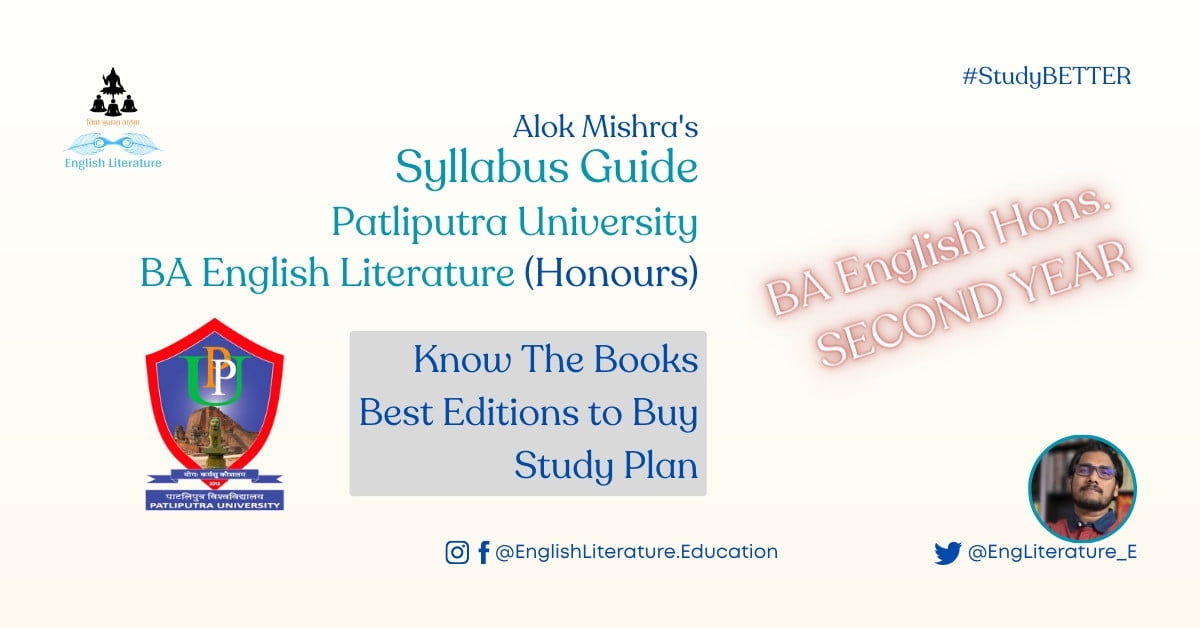Introduction: First of all, let’s try to understand what a syllabus is and why it becomes essential to study it (before you begin studying for your examinations). A syllabus is a comprehensive document that outlines the course’s objectives, content, schedule, assignments, and expectations. It serves as a roadmap for both students and instructors, providing essential information about the course’s goals, readings, assessment methods, and policies. In short, you must know your syllabus in order to achieve better scores in your examinations and also to be able to study effectively.
What are the contents of the BA English Literature (Honours) Second Year Syllabus of Patliputra University?
Let’s get straight to the point. As a second-year English Literature Honours student, you have to study two papers. The third paper (paper III) covers English Drama and the fourth paper (paper IV) covers English novels and prose. Have a look at the contents below:
Paper III
- Dr. Faustus by Christopher Marlowe
- Macbeth by William Shakespeare
- Volpone or the Fox by Ben Jonson
- The Way of the World by William Congreve
- The Rivals by Richard Sheridon
Marks Distribution:
A student will have to answer 4 critical questions (out of 10, 2 from each book) – 60 marks, write 4 explanations (out of 10, 2 from each book) – 30 marks, and write the definitions of 5 figures of speech with examples carrying 10 marks.
Paper IV
- Ecclesiastes from the Bible
- Gulliver’s Travels by Jonathan Swift
- Pride and Prejudice by Jane Austen
- Great Expectations by Charles Dickens
- Far from the Madding Crowd by Thomas Hardy
Marks Distribution:
A student will have to answer 4 critical questions (out of 10, 2 from each book) – 68 marks and write 4 explanations (out of 10, 2 from each book) – 32 marks.
How to buy the best editions of texts prescribed in the syllabus?
What does a good book do? It offers you the authentic text and also the supporting context, concepts, and ideas that aid your understanding of the work of literature. So, you must buy books from reputed publishers who offer quality text and wide context. Below, I will put links to all the books and their best editions on Amazon India. You can click on the links and buy the books from there.
Plays from Paper III
Dr Faustus by Marlowe – Atlantic Edition (help book)
Dr Faustus – Original Text Book
Macbeth by Shakespeare – (Text + Help Book)
Volpone by Ben Jonson – (help book)
Volpone by Jonson – Original Text Book
The Way of the World by William Congreve (Text + Help Book)
The Rivals by Richard Sheridan (Text + Help Book)
Novels & Prose from Paper IV
Pride and Prejudice (Text + Help Book)
Far from the Madding Crowd by Hardy (Text Book)
Great Expectations by Charles Dickens (Text + Help Book)
Gulliver’s Travels by Swift (Text + Help Book)
Ecclesiastes from the Bible
You should buy the original texts with helping texts or the helping books along with the original texts (in case no good critical + text edition is available). Get all the books mentioned in the syllabus to ensure you get a complete idea of the literary texts and do a comprehensive study.
How to Ensure You Complete Your Syllabus?
As a student, completing your syllabus involves navigating through the course’s objectives, readings, assignments, and expectations to ensure a successful academic journey. Here’s a step-by-step guide on how to approach completing your syllabus from a student’s perspective:
1. Familiarise Yourself with Learning Outcomes:
Start by understanding the learning outcomes outlined in the syllabus. These objectives provide a clear understanding of what you’re expected to achieve by the end of the course.
2. Organise Your Materials:
Gather the required textbooks, readings, and other course materials mentioned in the syllabus. Having these resources on hand will help you stay on top of the content and assignments.
3. Review the Schedule:
Take a close look at the week-by-week schedule provided in the syllabus. This will give you an overview of the topics, readings, and assignments that will be covered throughout the semester.
4. Note Important Dates:
Highlight key dates such as assignment due dates, exams, and any other important events. This will help you plan your time effectively and avoid last-minute rushes.
5. Understand Assessment Methods:
Pay attention to the different types of assessments mentioned in the syllabus, such as quizzes, essays, projects, and presentations. Understand how each assessment contributes to your overall grade.
6. Plan Your Study Time:
Use the syllabus to create a study plan that aligns with the schedule and assignments. Allocate time for reading, studying, and working on assignments to ensure you’re well-prepared for each class.
7. Engage Actively in Class:
Participate actively during class discussions, group activities, and lectures. This will help you better understand the material and engage with the course content.
8. Refer to Policies and Expectations:
Take note of the policies mentioned in the syllabus, including attendance, late submission, and academic integrity. Adhering to these policies will contribute to a smooth learning experience.
9. Seek Clarification:
If you have any questions or uncertainties about the syllabus or course content, don’t hesitate to reach out to your instructor for clarification. It’s important to have a clear understanding of the expectations.
10. Stay Organized:
Keep the syllabus accessible and refer to it regularly. Use it as a guide to stay organized and ensure you’re meeting deadlines and completing assignments on time.
11. Adapt and Adjust:
Be open to adjusting your study plan and approach based on your progress and feedback from the course. Flexibility is key to adapting to the evolving demands of the syllabus.
12. Reflect and Review:
As the year progresses, periodically review the syllabus to track your progress and ensure you’re meeting the learning outcomes set for the course.
Completing your syllabus as a student involves active engagement, careful planning, and a commitment to staying informed about the course requirements. By following these steps, you can make the most of your academic experience and achieve your goals within the framework provided by the syllabus. Once you do this in a well-planned manner, your success in the examination and better scores become inevitable. So, do your best!
That’s it, guys!
All the best!
Complete your studies within time to have some breathing space before the examination looms over your head! Do your best! Excel!
Alok Mishra
for English Literature Education




